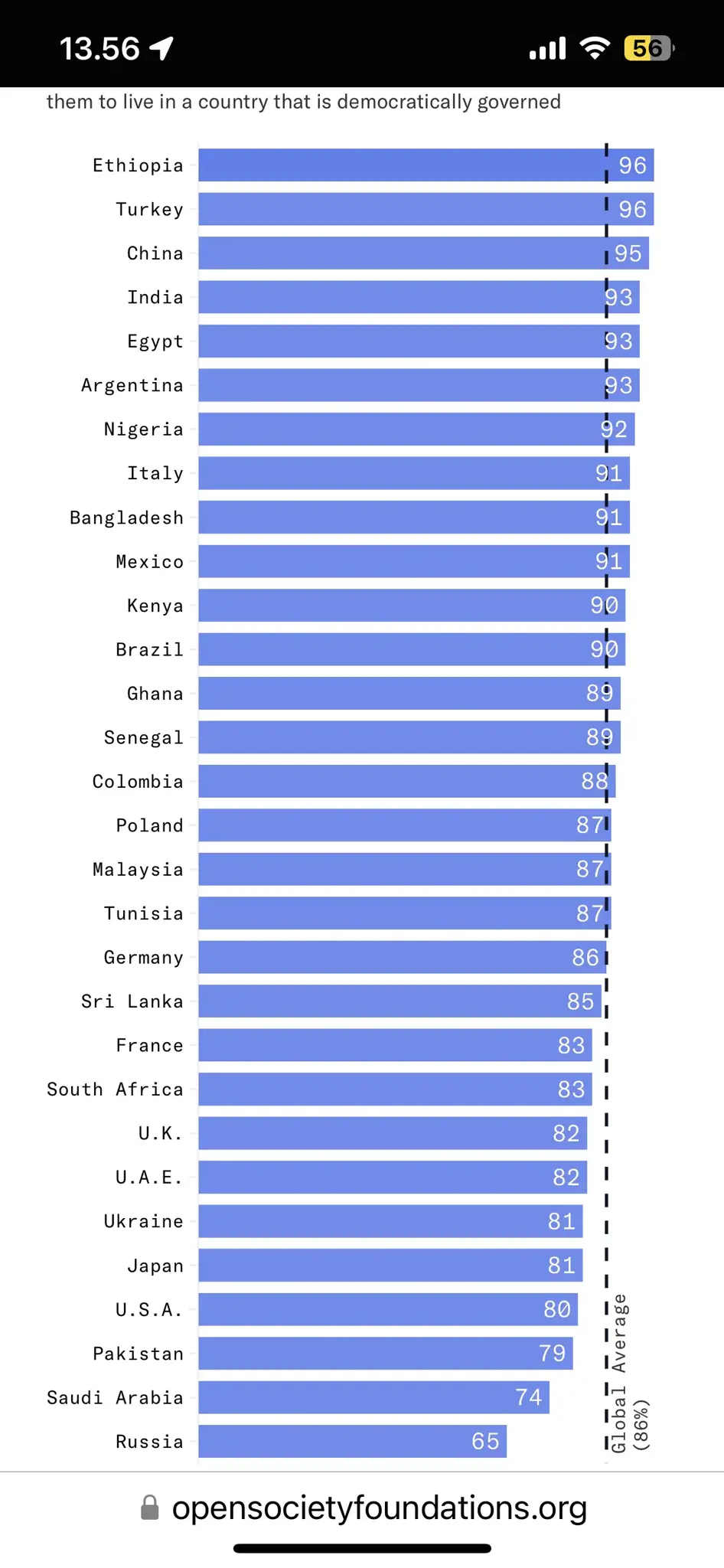Democracy remains popular across the world, but faced with a global array of challenges from inequality to the climate crisis, young people are far less likely than their elders to believe it can deliver on what concerns them.
According to a major international survey of 30 countries published on Tuesday, 86% of respondents would prefer to live in a democratic state and only 20% believe authoritarian regimes are more capable of delivering “what citizens want”.
However, only 57% of respondents aged 18 to 35 felt democracy was preferable to any other form of government, against 71% of those over 56, and 42% of younger people said they were supportive of military rule, against just 20% of older respondents.
I wish I could say I was surprised. Here in Finland we had a parliamentary election earlier in the year and ended up with the most right-wing government we’ve ever had, with zero leftist or centrist parties in the government. One fresh minister had to quit his post due to being a neo-Nazi, and the extremist party whose ministerial post it currently is replaced him with a pedophile neo-Nazi (who won a vote of confidence, so apparently that’s not a problem to anybody but leftists.)
Almost half of the under-25’s voted for right-wing parties. The most popular one was an extremist right-wing party (multiple neo-Nazis, politicians who openly fantasize about eg. murdering gay people, the works), and 2nd most popular was the “fiscally conservative” party (who really aren’t much better than the extremists, and in many ways actually worse).
I wonder why they assume democracy is fueling the problems we face, rather than, say, late-stage capitalism or plain old corruption.
“Democracy is the worst form of government, except for all the others.”
deleted by creator
You’re essentially just dismissing the result because you don’t like it. Check out the poll, it’s linked in the article; here’s the percentages for “IMPORTANCE OF LIVING IN A DEMOCRACY Percentage of respondents per country who say it is important to them to live in a country that is democratically governed”

Conservatives can openly break the law, and laugh while doing so. Liberals too often lack the spine to make them pay serious consequences, or any consequences at all. I can’t blame people for losing faith in democracy when it’s disintegrating before our eyes.
And unfortunately that’s going to probably lead to a whole lot of deaths in the near future
People always doubt democracy until they end up in a dictatorship of one kind or another. Then, they learn the hard way why a democracy is better.
Eh, I don’t know; eg. there were lots of unrepentant Nazis around right after WW II.
Some people are just, well, terrible. Right-wing authoritarians don’t really care about much except being able to hurt others in some way
Things aren’t going to get better, are they?
They are not.
Conservatives are currently an existential threat to humanity, and they’re winning because they’re literal psychopaths
I guess the reasoning varies based on regions.
I assume that in countries in Asia, Africa, or South America, people are wary of the term ‘democracy’ because:
- democracy can still be full of corruption,
- democracy when preached by the US, usually means ‘put politicians that allow our corporations to exploit your natural resources’
- democracy is synonymous with capitalism, politicians are bending over so that corporations can exploit citizens
I could see why disgruntled people, who see corrupt politicians or exploitative rich people go on scot free, wanted a government that could punish them. But of course anger leads to lack of clarity in making decision, thus they ended up preferring authoritarianism that will eventually backfire and target their own citizens.
I don’t know how European / North American youngsters feel, but somehow I have a nagging feeling that ISIS has casted a widespread fear that bolstered people’s support of right wing parties.
Check out the poll, it’s linked in the article. You might be surprised; here’s the percentages for “IMPORTANCE OF LIVING IN A DEMOCRACY Percentage of respondents per country who say it is important to them to live in a country that is democratically governed”

I’m honestly surprised by this because doesn’t Finland have like one of the best public education systems in the world? I’ve always thought strongly funded and accessible education is like the antidote to fascism, but it seems it’s much more complex than that. Fascists just always know how to push the right buttons to exploit people’s fears.
Not after >10 years of conservatives gutting education funding and blaming leftists for the inevitable decline of the system. Ditto with public healthcare, we have a legitimate healthcare crisis going on but they’re still going to cut more. Naturally with tax cuts for the rich that are going to be offset by decimating welfare, selling government property & state-owned stock of course.
The previous all-leftist government had to take 10bn€ in loans to help deal with COVID, and at the time the right was even calling for it so they could give money to businesses.
Now they’re claiming our current economic problems are purely the left’s fault and the spending was irresponsible (despite having previously wanted to take on more loans), and after less than half a year they’ve already confirmed they’ll be taking more than 10bn€ loans, just so they can give tax cuts to the rich and literally destroy the welfare system. So where leftists spent 10bn over 4 years to keep the country operational during a pandemic, the reich-wingers spent 10bn in half a year to make rich people even richer.
Conservatives are fucking evil.
It has been said that Democracy is the worst form of government except for call of the others. Winston Chuchill said that but not sure who he was referencing. There is some truth to that though.
Representative Democracy*
It wouldn’t change anything
Have you seen how old the average voter is?
You don’t think voting demographics would change radically if people could go out and vote on legislation directly instead of a bribed politician voting for them?
I’d be surprised because countries like Switzerland still have a big skew in their voters demographics
Democracy works really well when everyone in the voting group respects and values each-others’ opinions. I think this is probably only achievable in quite small groups.
Once it gets too big when a decision that you don’t like comes down the pipeline it doesn’t much matter to you whether a dictator proclaimed it or a bunch of faceless strangers voted for it.
If you live in a population that is large and non-homogeneous and are part of a minority 1 person 1 vote doesn’t feel great.
It would also be interesting to know how many of the respective groups did or didn’t vote.
Great question, that’d really would be pretty interesting to know. The actual study results are linked in the article so you can check it out of you have the energy. I read parts of it but I can’t remember what the question set was
@interolivary thank you social media.
I unironically do blame the internet and especially social media. Used to be that shitty people often got either “lectured” or shunned by the society around them, which seems to have created more opportunities for them to go “what the fuck was I thinking, I was so wrong”. Now they go online and find millions of even worse people and feel like their ideas are actually accepted and valid in general and not just among other shitheads.
🤖 I’m a bot that provides automatic summaries for articles:
Click here to see the summary
Democracy remains popular across the world, but faced with a global array of challenges from inequality to the climate crisis, young people are far less likely than their elders to believe it can deliver on what concerns them.
According to a major international survey of 30 countries published on Tuesday, 86% of respondents would prefer to live in a democratic state and only 20% believe authoritarian regimes are more capable of delivering “what citizens want”.
At a time of multiplying national and international crises – respondents were most worried about poverty and inequality (20%), the climate crisis (20%) and corruption (18%) – more than half (53%) felt their country was heading in the wrong direction, and about a third said politicians were not working in their best interests.
About 70% of the more than 36,000 people surveyed said they were worried the climate crisis would affect them and their livelihoods in the coming year, with those in Bangladesh (90%), Turkey (85%), Kenya (83%) and India (82%) the most concerned, and in China (45%), Russia (48%) and the UK (54%) the least.
At a national level, however, corruption was the chief worry, with an average of 23% saying it is the top issue facing their country – ranging from 6% in Germany and 7% in France and the UK to 45% in Ghana, 44% in Nigeria and 37% in Colombia.
Of issues most directly affecting people personally, poverty and inequality ranked highest – including in Senegal, the smallest economy surveyed, and the US, the largest – with an average score of about 21%.
Saved 67% of original text.









